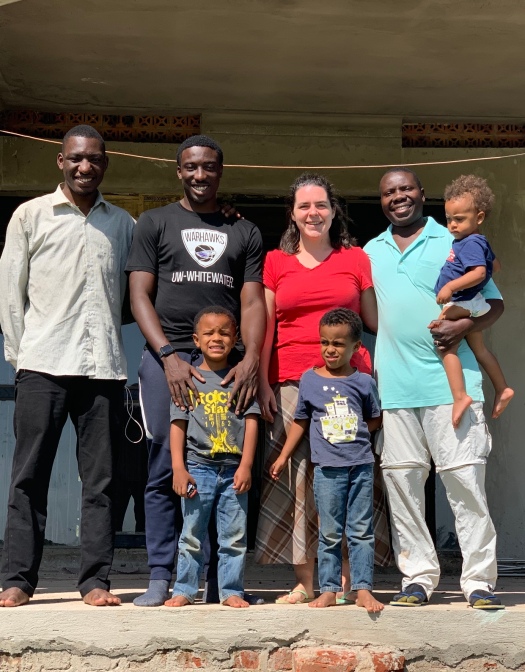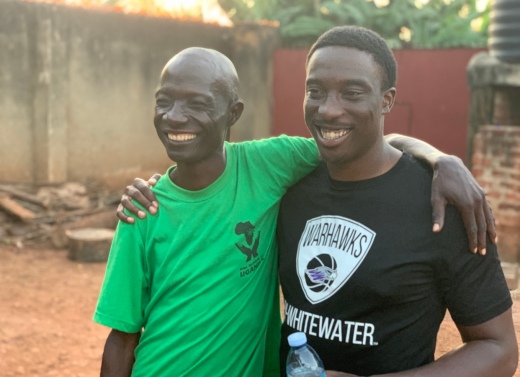I’m Back!
Welcome back everyone, now onto my second month here in Rwanda and I feel confident in saying that it feels like home. I can’t go for a walk around town without running into a player, colleague, or friend. I’m enjoying my time here but most importantly I’m learning something new every day. A part of why I’m learning so much is because I’m here on my own, fellows usually have the watchful eye of Chloe Rothman our Director of Programming to guide them. This year my situation is a bit different because she is currently in Boston until March, so it’s sink or swim for me. I’d like to believe I’m swimming pretty well. Kayonza, my place of residence feels like home, everyone is always helpful from the baristas at the coffee shop to the hotel receptionists at the front desk when I go lift weights. One of the main reasons I was excited for this opportunity was to answer a question, a specific one at that. How do we as Africans improve our continent? More specifically the countries which we come from. Every country in the world has its own unique set of problems, Rwanda and Uganda are no different. I am using these two East African countries as my case studies because they are what I know. Spending time in Rwanda has led me to appreciate the progress the country has made since the 1994 genocide, their focus on tourism, empowering women, and agriculture are three main reasons.
On the first weekend of February I was able to go home to Uganda to visit my family, it was a refreshing visit being that I hadn’t seen most of my people in about 3 years. I used this trip to further think about an answer to my question and gained insight from my family on the role they are playing in improving their immediate community.

My Family’s Mission
I am going to introduce you to Isaac and Rachel Mubezi, my Aunt and Uncle who have made it their life mission to improve Uganda by moving back to my family’s rural village. They created an NGO called Something Deeper Ministries, with the mission of using healthcare, spiritual and social development to sustainably improve conditions in rural Uganda. They met in Burundi during their college years, Rachel hailing from the rainy state of Washington obtained a degree in special education from Seattle Pacific University. She embarked on a journey as a missionary to teach elementary aged children in Burundi, where she met Isaac a practicing surgeon and my father’s youngest brother. My father’s side of the family comes from a small village called Kiwanyi located in Eastern Region of Uganda, more specifically Iganga District. Together they took on the ambitious project of building a functioning hospital in our rural village with the hope of inspiring the community.
The Problem
I’m sure many of you have heard the African proverb “It takes a village to raise a child”, without the village of Kiwanyi my father and Uncle Isaac would not be the men they are today. Now well-seasoned, along their journey it took grit to survive in this tough village. I’m referring to the same tenacity Patrick Beverly refers to when talking about making it out alive on the Westside of Chicago. Through observation Dr. Mubezi identified a problem, there was no inspiration in our village. No one for adolescents growing up in Kiwanyi to look up to other than your usual taxi driver or the neighborhood bartender. The exact same problem he and my father faced 40 years ago. Cousins my age and younger have fallen victim to life’s vices, especially alcohol. Predisposition to alcohol addiction and abuse is hereditary and alcoholism is common not only in my family but in Uganda. The nation is plagued with this disease and as of 2016 Uganda was Africa’s #2 consumer of alcohol. Stop and think about that, of the 54 countries on this continent we as Ugandan’s boast that stat. How sad. We have an abundance of youth with no role models and very little parental input. Education levels are extremely low and as a result, life situations that require critical thinking overwhelm a majority of the people. Uganda’s population is among the youngest in the world with 47% being 15 below as of 2019, while in 2020 70% of the nation is under 30 years old. These impressionable minds have no guidance, yet they are our leaders of tomorrow. If they are not given proper education, career guidance, and are not inspired to do good with their lives they will in turn resort to negative means. The most important reason this hospital was planted in rural Iganga was to inspire and empower our younger generations.
The Solution
Now that the problem has been identified you need to know that there are multiple sub-categories under the umbrella of “helping”. Realizing this problem, Isaac and Rachel began to brainstorm for solutions, and a sustainable organization was the answer. The Hope & Healing Hospital does three things. It offers a service where there is none, increasing access to healthcare in a place where it is most needed. Secondly, it provides employment opportunities for the qualified while the community’s economy receives a boost due to customer traffic. Lastly, from a “get up and go to work” standpoint the children in our village are able to see doctors, nurses, and engineers go through the daily grind of having a career. To you readers it may seem like nothing, but this is life changing for children to see a doctor dress with tact, get up and go to work on a daily basis. Something other than the usual sugar cane farmer they see every day. Staff members of the hospital strategically live amongst the community for this reason. The average Ugandan has 7.2 children, a nurse living next to three families is influencing 21 lives a day by getting up and earning a paycheck.
Initially, to create a sense of ownership amongst the community this plan was first proposed to them out of respect. They obliged and 9.5 acres on the hospital property was allotted to the village, where a farming project is now taking place. The strength of Uganda is its agriculture boasting some of the best soil in East Africa. So a demonstration garden was planted to guide the people who initially didn’t quite understand the market value of certain crops or the concept of supply and demand. Pineapple was a great substitute for the usual sugar cane, a low maintenance crop with high return. It has been great with the 9.5 acres now boasting 25,000 pineapples! Matoke a part of the banana family was also planted. The focus on agriculture was necessary because an increase in food production boosts Kiwanyi’s economy, curbs malnutrition, and puts money in people’s pockets giving them independence. With the community now invested, health care became subsidized. Each member pays 10k UGX (2.70 USD) as a membership fee, receiving a booklet. It is common for people to only show up in dire situations, due to the cost. This booklet now allows patients to visit the doctor as many times as they want to for free, incentivizing regular check-ups. It is common for people to only show up in dire situations, due to the cost. As the Lao-Tzu states in the Chinese proverb “Give a man a fish, you feed him for a day. Teach a man how to fish and you will feed him for a lifetime.” This is the backbone of Something Deeper Ministries, providing people with sustainable life skills, something deeper than a handout.
Reflection
I took in all of this information during my weekend and I believe I found an answer to my question. The Mubezi family chose to use medicine as their vehicle in Eastern Uganda and for us at Shooting Touch it is through basketball and health education. At the end of the day we are showing through example, that you can do something big with your life. However, these children in Africa need tangible examples and I believe that is what was missing but now is here! Take the NBA and FIBA for example, a child from the eastern village of Rwinkwavu can now go to Kigali and see elite basketball talent in his own country. Making tangible the dream to one day play on that stage. Or using any other God given talents to work in the business of basketball, something that wasn’t possible 15 years ago.
You as a reader can also change your immediate community. Start by improving yourself, tackle the evils you personally face on a daily basis. Aim for the highest good you can imagine and dedicate yourself to this aim. You in turn will find that even in failure you will learn something about yourself.
Stay blessed!

Website to Something Deeper Ministries: Founded by Rachel & Isaac Mubezi

